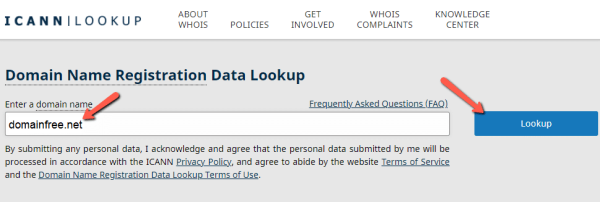Where do I find a domain? Although the basis of our conversation is an answer to that question, we have to know that the distinction between a domain name and a website confounds many small company web administrators.
As a result, it frequently happens that people forget where they registered their domain names and who their domain registrar is. They typically run into this issue after recently renewing their web hosting subscription when their website suddenly stops functioning.
Do not worry if you do not know who your domain name registrant is! Finding this information is simple, and this post will give instructions on how to move further. We will go through the specifics of a domain name registrar, the services it provides, and a few ways to determine who your domain registrar is.
Where do I find a domain?
What is a domain name and where do I find a domain? A domain name is like a street address online. Instead of utilizing its internet protocol (IP) address, it makes it easier for people to discover your website. An essential component of the Internet’s infrastructure is domain names, which are composed of a name and an extension.
How Do Domains Function and Where Do I Find a Domain?
The two essential components of every website are a domain name and a web hosting server. All domain names refer to the distinct web servers that house the websites and are associated with their corresponding IP addresses.
A global network of Domain Name System (DNS) servers searches for the corresponding IP address when a user enters a domain name into a browser.
The web browser then asks for information about the website from the domain’s hosting provider after receiving the IP address information from the server. This web server houses the website’s files, database, and HTML code.
The web browser transforms the data into a web page that users may access once the host sends it back.
What Justifies Purchasing a Domain Name?
After you got to know Where do I find a domain? It is time to justify the justification behind buying the domain name.
The opportunity to start a company or blog on a free or paid hosting site, or even on social media, is abundant in the internet world. On free Facebook pages and blogging platforms like BlogSpot or Medium, users can claim a space for posting data and images of any kind.
Online stores like Shopify and Etsy give business owners a venue to offer both tangible and intangible products. Creative professionals, such as photographers and designers, may create an online portfolio without starting from scratch thanks to websites like Squarespace.
These websites serve as examples of how an online presence may exist without a personal domain. However, these platforms and social media websites have significant downsides if your goal is to be widely visible and establish authority for your brand—issues that may be solved with the acquisition of your very own domain name.
Find Your Domain Provider: How to Do It

Examine your billing records
The first approach you ought to employ is arguably the easiest: checking your billing records. Typically, the place where you purchased your domain name is your domain name registrar. Try looking through your email archives for information on your domain name registration (or transfer) if you can’t recall who that registrar is. On your bill, the domain registrar should be identified.
Keep your domain registrar informed of any changes to your email address and/or contact details immediately. Notifications for renewal are sent by registrars to the specified email address.
Use ICANN Lookup or WHOIS
You can perform a web search for your domain registrar if you are unable to locate your billing details. What the registrar knows about your domain name may be found out with a few simple WHOIS queries. There are several legal uses for the WHOIS domain database, which contains a list of all domains that have been registered.
The contact email, physical address, phone number, and fax number of the name owner are often included in public WHOIS information. Except if the owner is utilizing a domain privacy feature like IDProtect.
A WHOIS service will also reveal the domain name’s establishment and expiration dates, as well as the current registrar and DNS servers. Use a WHOIS service like Who.
is. to find out who the domain registrar is for your domain. Take the following actions:
The bar above your IP address should show your domain name;

When you press the magnifier button, the information in the Registrar Info block will appear on the results page. Your domain registrar’s name and website are listed there.
You may also use ICANN Lookup to locate your domain name registrar:
In the search box, type in the domain name you own;

Choose Lookup;
Registrar Information is located once you scroll down the results page.

Types of Domain Names
The suffix or last component of a domain name is referred to as a top-level domain (TLD). A small number of preset suffixes are available, including:
- The most popular TLD for commercial businesses is .com.
- Organizations (usually nonprofit) with the .org domain name
- Federal agencies at .gov
- Education-related websites end in .edu
- Network organizations in .net
- Military domain .mil
Generic top-level domains (gTLDs) and country-code top-level domains (ccTLDs) are the two primary categories into which TLDs are divided.
.com, .org, .edu, and other generic top-level domains (gTLDs) are examples of generic top-level domain names that specify the domain class they belong to.
A nation, region, or territory is designated by a two-letter domain extension known as a country code top-level domain (ccTLD), such as the .uk or.fr.
Because they are more individualized, adaptable, and pertinent, nTLDs are new top-level domain names that are targeted at businesses, organizations, and services. The nTLDs “.voyage”, “.app”, “.ninja”, “.cool”, etc. are some examples.
Where do I find a domain and where can I purchase a domain name?
Answer Where do I find a domain? you should know that To register a domain name, you must pay an annual cost. You will have the opportunity to renew your registration when it expires. If you don’t, other people will be able to purchase the domain name.
Godaddy.com and NameCheap are undoubtedly two of the most well-known domain name registrars, although there are many others. For those launching a new e-store, Shopify now provides the opportunity to purchase a domain name via them.
Read More: What domain means? Definition, examples, and meaning


